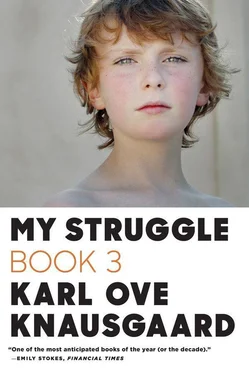In the afternoon we ate cake and drank pop. I had never been allowed to invite friends on my birthday, and nor was I on this one. I was sullen and surly, I ate the cake without a word, and when Dad put the presents in front of me, with a smile that showed no insight into what had happened that morning, as though it were possible to start afresh, I looked down and unwrapped the Everton uniform without showing any sign of pleasure.
“How nice,” Mom said. “Are you going to try it on?”
“No,” I said. “I tried it on in the shop. Fits perfectly.”
“Put it on,” Dad said. “So Mom and Yngve can see.”
“No,” I said.
He eyed me.
I took the uniform to the bathroom, changed, and went back in.
“Excellent,” Dad said. “I bet you’ll be the coolest on the field this winter.”
“Can I take it off now?” I said.
“Wait till we’ve finished with the presents,” Dad said. “Here’s one from me.”
He passed me a small, square packet that had to be a cassette.
I opened it.
It was the new Wings cassette. Back to the Egg.
I looked at him. He looked out of the window.
“Do you like it?” he said.
“Oh yes,” I said. “It’s the new Wings cassette! I’ll play it now!”
“Hang on a moment,” he said. “You’ve got a couple of presents left.”
“Here’s a tiny one from me,” Mom said.
It was big but light. What could it be?
“Just something for your room,” she said.
I unwrapped it. It was a stool. Four wooden legs and a kind of net seat between them.
“What a great stool,” Yngve said.
“Thanks, Mom,” I said. “It’ll be good for when I read!”
“And here’s one from me,” Yngve said.
“Really?” I said. “I wonder what you’ve come up with this time?”
It was a book on how to play the guitar.
I looked at him with moist eyes.
“Thank you very much,” I said.
“It’s got scales, solos, everything,” he said. “Very simple. There’s a black dot for where you have to press. Even you can follow that.”
For the rest of the day I listened to Back to the Egg.
Yngve came in and said that John Bonham, the drummer in Led Zeppelin, was on one of the songs. And he had read in the newspaper that a Norwegian priest spoke at the beginning of one of the songs. It had to be at the start of the LP, we figured out, “Reception,” where there was a recording off the radio.
“There!” Yngve said. “Play it again!”
And then I heard it, too.
“ Men la oss nå prøve et øyeblikk å se i dette lys av Det nye testamentet ,” a faint, grating old man’s voice said.
The thought that neither Paul McCartney, Linda McCartney, Denny Laine, Steve Holly, nor Laurence Juber had a clue what was being said there, but that Yngve and I did, as we were Norwegian, sent my senses into free fall.
As always, Dad was kind all Christmas, even in the morning. As New Year’s Eve approached and the shops finally opened for a few hours, Mom drove to Arendal to buy some food and fireworks. She must have intimated that perhaps it wasn’t necessary to spend hundreds of kroner on rockets, as Dad always did, at any rate, it was she who had the responsibility for buying fireworks while Dad kept well in the background.
It wasn’t a great success.
Dad usually showed us the rockets he had bought and said, well, this year we were going to knock Gustavsen into a cocked hat, for instance, or there were going to be a few really big bangs this year! When New Year’s Eve came we would see him standing outside on the shimmering snow astutely and meticulously arranging the launch site. With a strand of hair hanging down over his face, which his beard almost blotted out in the darkness, he would set up the clothesline in the snow and line the biggest rockets up against it, and place the others in a whole battery of bottles and hollow objects. Once the preparations had been made, he would wait until half past eleven. Then he would call us outside and the New Year was brought in with several salvoes. He started small, with a few little firecrackers or sparklers that Yngve and I were allocated, and then he gradually stepped up the power until the biggest rocket was launched at twelve. Afterward he would declare that there had been lots of wonderful rockets this year but we, as usual, had had the best. That, of course, was open to debate because we were not the only ones to invest money in fireworks, Gustavsen and Karlsen did, too.
But this New Year’s Eve Dad, the King of Fireworks, had abdicated.
I pondered quite a bit on the cause. Whatever it was, I suspected that the consequences would be of major significance. No, it wasn’t a suspicion, I knew.
When it was a few minutes after half past eleven and Mom said perhaps it was time to go out and light the rocket, my jaw dropped.
“ The rocket?” I said. “Do we only have one? One rocket?”
“Yes,” Mom said. “Surely that’s enough? It’s a big one. They said in the shop it was the biggest and best they had.”
Dad smirked to himself. He went out after Yngve and me, stood beside us on the terrace at the back of the house where the launch was to take place.
The rocket really was big, she was right about that.
She put it in a bottle, but the bottle was too small, and both the bottle and rocket tipped over. She stood it up and looked around. Her light-colored leather coat was open, the zippers in her high boots were undone, making them seem as if they were unfolding as she moved, like two exotic plants. Around her neck she had wound her thick, rust-brown scarf.
“We could use something bigger to put this rocket in,” she said.
Dad said nothing.
“Dad normally uses the clothes horse,” Yngve said.
“That’s true!” Mom said.
The clothes horse, which was only used in the summer, was made of wood and leaned against the wall. Mom fetched it and set it up in the snow. She crouched down and positioned the rocket against it, but, seeing at once that it wouldn’t work, she stood up with the rocket in her hand. Around us fireworks were going off everywhere. The sky was lit with explosions, which we sensed rather than saw because it was overcast and misty, so of the showers of stars and all the colors and patterns not much more than flashes of light were to be seen.
“What about if you lay it on its side,” Yngve said. “Dad usually does that.”
Mom did as he suggested.
“It’s twelve o’clock now,” Dad said. “Aren’t you going to light our rocket soon?”
“Yes,” Mom said. She took a lighter from her pocket, crouched down, shielded the tiny flame with her hand, and averted her whole body, ready to run. The second the fuse was lit she dashed toward us.
“Happy New Year!” she said.
“Happy New Year,” Yngve said.
I said nothing because the rocket, which the burning fuse had reached now, sounded as if it was going to fizzle out. Then the flame died and the hiss stopped.
“Oh no,” I said. “It didn’t work! It was a dud! And we’ve only got one. Why did you buy only one? How could you do that?”
“That was New Year’s Eve then,” Dad said. “Perhaps I should be in charge of the fireworks next year?”
I had never felt so sorry for Mom as I did then, when we left the rocket and went into the warm, surrounded by neighbors’ exultant shouts and explosions. What hurt most was that she had done the best she could. She couldn’t do any better.
One afternoon two weeks later I was down by Lake Tjenna and my legs were absolutely freezing. Framlaget, the Socialist Party’s children’s organization, which I and almost all the other kids on the estate were in, had arranged a ski race. There were numbers on chests and medals for everyone, but above all else it was numbingly cold standing there and waiting your turn. And when my turn did come, my skis were slippery, I could never really get a decent speed going, and I finished way down the results list. As soon as I had passed the line and received my medal I set course for home. The darkness hung between the branches, the cold chafed at my toes, the skis kept slipping and sliding, I couldn’t even manage the steepest hill using the herringbone technique and had to ascend sideways. But at last the road was there with its illuminated street lamps like a luminous ribbon in the dusk, and our house was on the other side. I staggered across and into the drive, undid my skis and leaned them against the house, opened the door, and stopped.
Читать дальше












